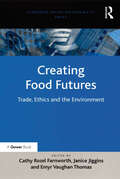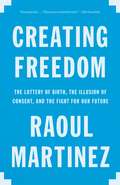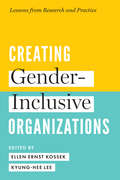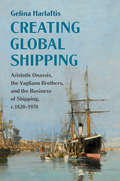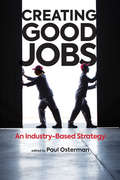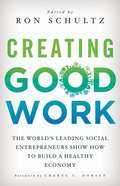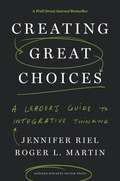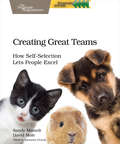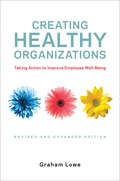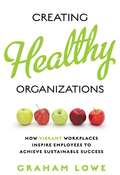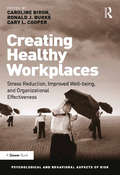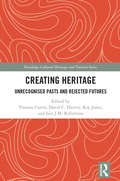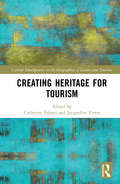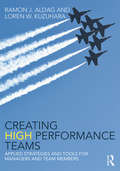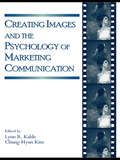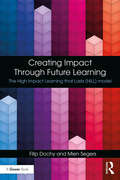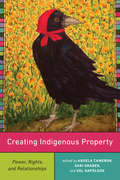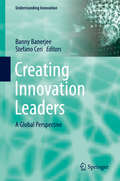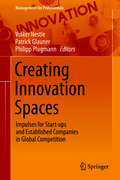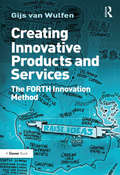- Table View
- List View
Creating Food Futures: Trade, Ethics and the Environment (Corporate Social Responsibility)
by Janice JigginsA global transformation in food supply and consumption is placing our food security at risk. What changes need to be made to the ways we trade, process and purchase our food if everyone in the world is going to have enough wholesome food to eat? Is there genuine scope for creating food futures that embrace considerations such as ecological sustainability and social equity as well as placing good food on the table - and making money? Drawing upon examples of innovative food chains in Europe, Canada, Africa and Latin America, leading academics and practitioners challenge the idea that individuals are powerless in the face of global supply chains and the legal apparatus protecting them. The authors do not, however, underestimate the scale of the task at hand. They explore the tensions and dilemmas inherent in innovative practice - such as the ethics of mainstreaming, balancing a variety of goals and the ways in which success is defined - as well as presenting success stories and explaining how they were achieved. Creating Food Futures provides you with inspiring examples of what is being done and thought-provoking suggestions for future work.
Creating Frameworks for Possibility: Being a Visionary Leader and Practicing the Art of Possibility
by Rosamund Stone Zander Benjamin ZanderAs a species, we are well-suited to thrive in an environment of threat where resources are scarce, but are not always ready to reap the benefits of harmony, peace, and plenty. Yet we do have the capacity to override the hidden assumptions of peril that create the world we see. The foremost challenge for leaders today, the authors suggest, is to maintain the clarity to stand confidently in the universe of possibility, and to bring the hope of possibility to others. This "leader of possibility" rejects the fear of scarcity that promotes divisions between people. Frameworks that bring forth possibility, restructure meanings, create visions, and establish environments where anything is possible is the work of this new leader and this chapter outlines the steps for inventing and sustaining these frameworks. This chapter was originally published as Chapter 11 of "The Art of Possibility: Transforming Professional and Personal Life."
Creating Freedom: The Lottery of Birth, the Illusion of Consent, and the Fight for Our Future
by Raoul MartinezThe ideal of freedom is at the heart of our political and economic system. It is foundational to our sense of justice, our way of life, our conception of what it is to be human. But are we free in the way that we think we are?In Creating Freedom, Raoul Martinez brings together a torrent of mind-expanding ideas, facts, and arguments to dismantle sacred myths central to our society—myths about free will, free markets, free media, and free elections. From the lottery of our birth to the consent-manufacturing influence of concentrated power, this far-reaching manifesto lifts the veil on the mechanisms of control that pervade our lives. It shows that the more we understand how the world shapes us, the more effectively we can shape the world. A highly original exploration of the most urgent questions of our time, Creating Freedom reveals that we are far less free than we like to think, but it also shows that freedome is something we can create together. In fact, our very survival may depend on our doing so.
Creating Gender-Inclusive Organizations: Lessons from Research and Practice
by Ellen Ernst Kossek Kyung-Hee LeeThis book examines key themes relevant to advancing women in organizations and the need for individual and organizational mechanisms to foster career agility, with a constant focus on how to bridge research to practice. Providing insights on gender inclusion, mentoring, team diversity, and female leadership, Creating Gender-Inclusive Organizations provides actual hands-on advice from experts on how to leverage human resource and organizational strategies to advance women and close the gender gap. It is a must-read for management leaders, HR professionals, and gender and diversity organizational scholars of all levels.
Creating Global Opportunities
by Chris Jephson Henning MorgenToday's trade is global. A company can choose to have its headquarters in one part of the world, its production facilities in another and sell its brands in all markets. Since the first sea-borne container transport took place in 1956, the shipping industry has been one of the main facilitators of the globalisation of trade. This book traces the rise to prominence of Maersk Line - the world's leading container operator - and the internal decision-making processes that lay behind the firm's extraordinary expansion between 1973 and 2013. With unprecedented access to company archives, interviews with current and former employees, and extensive statistical information provided by The Economist Intelligence Unit, Containerisation International and Lloyd's Register, this is a valuable resource for students of logistics, shipping or international business. This first inside account of the challenges of building a global business will also appeal to industry specialists and the general business reader.
Creating Global Shipping: Aristotle Onassis, the Vagliano Brothers, and the Business of Shipping, c.1820–1970 (Cambridge Studies in the Emergence of Global Enterprise)
by Gelina HarlaftisShipping has been the international business par excellence in many national economies, one that preceded trends in other, more highly visible sectors of international economic activity. Nevertheless, in both business or economic history, shipping has remained relatively overlooked. That gap is filled by this exploration of the evolution of European shipping through the study of two Greek shipping firms. They provide a prime example of the regional European maritime businesses that evolved to serve Europe's international trade and, eventually, the global economy. By the end of the twentieth century, Greeks owned more ships than any other nationality. The story of the Vagliano brothers traces the transformation of Greek shipping from local shipping and trading to international shipping and ship management, while the case of Aristotle Onassis reveals how international shipping was transformed into a global business.
Creating Good Jobs: An Industry-Based Strategy (The\mit Press Ser.)
by Paul OstermanExperts discuss improving job quality in low-wage industries including retail, residential construction, hospitals and long-term healthcare, restaurants, manufacturing, and long-haul trucking.Americans work harder and longer than our counterparts in other industrialized nations. Yet prosperity remains elusive to many. Workers in such low-wage industries as retail, restaurants, and home construction live from paycheck to paycheck, juggling multiple jobs with variable schedules, few benefits, and limited prospects for advancement. These bad outcomes are produced by a range of industry-specific factors, including intense competition, outsourcing and subcontracting, failure to enforce employment standards, overt discrimination, outmoded production and management systems, and inadequate worker voice. In this volume, experts look for ways to improve job quality in the low-wage sector. They offer in-depth examinations of specific industries—long-term healthcare, hospitals and outpatient care, retail, residential construction, restaurants, manufacturing, and long-haul trucking—that together account for more than half of all low-wage jobs.The book's sector view allows the contributors to address industry-specific variations that shape operational choices about work. Drawing on deep industry knowledge, they consider important distinctions within and between these industries; the financial, institutional, and structural incentives that shape the choices employers make; and what it would take to make more jobs better jobs.ContributorsEileen Appelbaum, Rosemary Batt, Dale Belman, Julie Brockman, Françoise Carré, Susan Helper, Matt Hinkel, Tashlin Lakhani, JaeEun Lee, Raphael Martins, Russell Ormiston, Paul Osterman, Can Ouyang, Chris Tilly, Steve Viscelli
Creating Good Work
by Ron SchultzWhile social entrepreneurship continues to grow by leaps and bounds over the last decade, practitioners have begun to realize that no one model can be used for every type of social venture. Be it a start-up for enhancing the educational opportunities a community has access to or a program to address the sustainability of a region's environment, each type of social venture comes with its own hardships and pitfalls on its path to creating a better tomorrow. Creating Good Work is a practical resource that goes beyond storytelling. It is a rich guide book recounts the stories of some of the most successful social entrepreneurial programs operating today, with real life examples of and how they overcame both physical and societal barriers to create a lasting impact on the world they encounter. Including contributions from leading names at such social ventures as Benetech, Brac-USA, KivaRoot Capital, Skoll Foundation, 7th Generation, and YouthBuild, many of whom have been recognized by organizations like the Skoll Foundation and Ashoka: Innovators for the Public as being among the world's best. The lessons these leaders share contained in this volume are an asset to any social entrepreneur looking for new and innovative ways to have a positive impact on change the world around them, be they at their initial concept phase or a successful venture looking to expand their sphere of influence.
Creating Good Work: The World's Leading Social Entrepreneurs Show How to Build a Healthy Economy
by Ron Schultz Cheryl L. DorseyWhile social entrepreneurship continues to grow by leaps and bounds over the last decade, practitioners have begun to realize that no one model can be used for every type of social venture. Be it a start-up for enhancing the educational opportunities a community has access to or a program to address the sustainability of a region's environment, each type of social venture comes with its own hardships and pitfalls on its path to creating a better tomorrow. Creating Good Work is a practical resource that goes beyond storytelling. It is a rich guide book recounts the stories of some of the most successful social entrepreneurial programs operating today, with real life examples of and how they overcame both physical and societal barriers to create a lasting impact on the world they encounter. Including contributions from leading names at such social ventures as Benetech, Brac-USA, KivaRoot Capital, Skoll Foundation, 7th Generation, and YouthBuild, many of whom have been recognized by organizations like the Skoll Foundation and Ashoka: Innovators for the Public as being among the world's best. The lessons these leaders share contained in this volume are an asset to any social entrepreneur looking for new and innovative ways to have a positive impact on change the world around them, be they at their initial concept phase or a successful venture looking to expand their sphere of influence.
Creating Good Working Conditions Throughout the Supply Chain: Locally and Globally
by Jody HeymannRegardless of its origin, any organization that is working across borders needs to answer a fundamental question about the nature of the work environment: If your company is from a high-income country with an operation in a low-income country, which aspects should be similar to the other local worksites and which should be similar to those in your company's headquarters? How should wages be structured, benefits be determined, and work conditions be regulated? Drawing on fifteen years of research, in this chapter the authors provide an in-depth analysis of the three crucial areas of the work environment your company needs to focus on to ensure product safety, maintenance of your corporate brand image, and employee motivation. While the benefits seem straightforward, there are challenges and complexities to instituting company policies globally. With rich examples from companies in places like China, Vietnam, and Cambodia, this chapter will help you understand how your company can meet these challenges- from selecting global suppliers to providing labor standards information to consumers. This chapter was originally published as Chapter 9 of "Profit at the Bottom of the Ladder: Creating Value by Investing in Your Workforce."
Creating Great Choices: A Leader's Guide to Integrative Thinking
by Jennifer Riel; Roger L. MartinThe book includes fresh stories of successful integrative thinkers that will demystify the process of creative problem solving, as well as practical tools and exercises to help readers engage with the ideas. And it lays out the authors' four-step methodology for creating great choices, which can be applied in virtually any context. The result is a replicable, thoughtful approach to finding a "third and better way" to make important choices in the face of unacceptable trade‐offs.
Creating Great Teams: How Self-Selection Lets People Excel
by Sandy Mamoli David MolePeople are happiest and most productive if they can choose what they work on and who they work with. Self-selecting teams give people that choice. Build well-designed and efficient teams to get the most out of your organization, with step-by-step instructions on how to set up teams quickly and efficiently. You'll create a process that works for you, whether you need to form teams from scratch, improve the design of existing teams, or are on the verge of a big team re-shuffle. Discover how New Zealand's biggest e-commerce company completely restructured their business through Self-Selection. In the process, find out how to create high-performing groups by letting people self-organize into small, cross-functional teams. Step-by-step guides, easy-to-follow diagrams, practical examples, checklists, and tools will enable you to run a Self-Selection process within your organization.If you're a manager who wants to structure your organization into small teams, you'll discover why Self-Selection is the fastest and safest way to do so. You'll prepare for and organize a Self-Selection event and make sure your Self-Selection participants and fellow managers are on board and ready. If you're a team member, you'll discover what it feels like to be part of a Self-Selection process and what the consequences are for your daily work. You'll learn how to influence your colleagues and bosses to be open to the idea of Self-Selection. You'll provide your manager with a plan for how to facilitate a Self-Selection event, and with evidence that the system works.If you're feeling the pain and chaos of adding new people to your organization, or just want to ensure that your teams have the right people with the right skills, Self-Selection will help you create the effective teams you need.
Creating Healthy Organizations: Taking Action to Improve Employee Well-Being, Revised and Expanded Edition
by Graham LoweHow can you future-proof your organization by making it humanly sustainable? Creating Healthy Organizations answers this question, showing how to forge stronger links between employee well-being and the future success of any organization. The book makes a compelling case for resilient and humanly sustainable businesses by focusing on improving employees’ well-being. Employee stress, burnout, work-life conflict, and disengagement remain significant workplace problems. Yet, there are important signs of progress. The healthy organization concept has begun moving into the mainstream of corporate wellness. Scholarly research has advanced beyond making a business case for workplace health promotion to showing how successful interventions are based on a culture of health and closer ties with occupational health and safety. More companies are addressing mental health issues, striving to make workplaces psychologically healthy and safe. Expanded environmental sustainability frameworks provide an opening for the more sustainable use of human resources. As well, extensive tools are now available in many countries to guide actions aimed at developing healthy, safe, and thriving workplaces. These recent workplace trends and resources highlight the need for an updated, concise, integrated, and practical analysis of the challenges of creating a healthier organization, the hurdles that must be overcome along the way, and the key success factors that can guide the improvement process. Creating Healthy Organizations, Revised and Expanded Edition fills this gap in knowledge and practice, guiding those committed to making their organizations healthier.
Creating Healthy Organizations
by Graham LoweThe current global economic environment is defined by unprecedented uncertainty, a premium placed on knowledge, and the threat of future talent scarcity. Key to an organization's success under these conditions is its ability to strengthen the links between people and performance. Creating Healthy Organizations provides executives, managers, human resource professionals, and employees an action-oriented approach to forging these connections by creating and sustaining vibrant and productive workplaces.A healthy organization operates in ways that benefits all stakeholders, including employees, customers, shareholders, and communities. Using a wide range of examples from a variety of internationally based industries, Graham Lowe integrates leading practices with research on workplace health and wellness, quality work environments, employee engagement, organizational performance, and corporate social responsibility to make a compelling business case for creating healthy, resilient, and sustainable organizations.Creating Healthy Organizations offers readers, whether CEOs or front-line workers, an innovative framework and practical tools for planning, implementing, and measuring healthy change in their workplaces.
Creating Healthy Workplaces: Stress Reduction, Improved Well-being, and Organizational Effectiveness (Psychological and Behavioural Aspects of Risk)
by Caroline Biron Ronald J. BurkeThe contributions in Creating Healthy Workplaces include a number of interventions that relate the efforts undertaken by researchers and organizations together, to reduce stress and improve the mental and physical health of employees through positive change initiatives. Those working in the field of occupational stress have received criticism that too much emphasis has been placed on negative issues and that positive initiatives have been largely ignored. With the growing influence of the positive movement, this book explores the implications of using a positive approach as opposed to a stress management one and compares the types of interventions they each require. From a positive perspective, there is a need to understand the characteristics of healthy, thriving, and flourishing people and organizations. This book explores the implications of using a positive approach as opposed to a stress management one. Some of the interventions described in Creating Healthy Workplaces target individuals and their attitudes and behaviours, others target workplace relationships, work units and the wider organization. Outcomes such as reduced occurrences of smoking, obesity, depression, elevated blood pressure, accidents and workplace injuries, presenteeism, absence and staff turnover are reported. The factors associated with the success of these interventions are identified and advice is given as to how interested individuals and organizations might proceed to develop worksite interventions on their own.
Creating Heritage: Unrecognised Pasts and Rejected Futures (Routledge Cultural Heritage and Tourism Series)
by Thomas Carter David Charles Harvey Roy Jones Iain RobertsonThis book investigates the selection process of heritagisation to understand what specific pasts are being selected or rejected for representation, who is selecting them, how and to whom they are being represented and why they are being presented, or dismissed, in the ways that they are. Some aspects of our pasts are venerated and memorialised for a variety of reasons, while others are forgotten or even hidden. This volume, thus, provides examples from across a spectrum. Some phenomena are well-suited to heritagisation, such as animals memorialised for their bravery, long past agricultural techniques and implements, and impressive landscapes. However, this book also deals with products (e.g. tobacco), historical periods (e.g. the Third Reich) and scientific techniques (e.g. genetic modification) with negative connotations that extend beyond their heritage attributes. This volume considers how the actors in the heritage industry admit, valorise, prioritise and rationalise historic resources as heritage products. These findings provide practical examples of how heritage institutions privilege, frame and/or exclude a wide range of heritage items. They also contrast the invocations of sectional (local, national or class based) and more cosmopolitan heritages and consider the extent to which innovation and change are or can be acknowledged within the heritage discourse.
Creating Heritage for Tourism (Current Developments in the Geographies of Leisure and Tourism)
by Catherine Palmer Jacqueline TiversWhat does ‘heritage’ mean in the twenty-first century? Traditional ideas of heritage involve places where objects, landscapes, people and ideas are venerated and reproduced over time as an inheritance for future generations. To speak of heritage is to speak of a relationship between the past, the present and the future. However, it is a past recreated for economic gain, hence sectors such as culinary tourism, ecotourism, cultural tourism and film tourism have employed the heritage label to attract visitors. This interdisciplinary book furthers understanding on how heritage is socially constructed, interpreted and experienced within different geographic and cultural contexts, in both Western and non-Western settings. Subjects discussed include Welsh linguistic heritage, tango, mushroom tourism, Turkish coffee, literary tourism and the techniques employed to construct tourist accommodation. By focusing upon heritage creation in the context of tourism, the book moves beyond traditional debates about ‘authentic heritage’ to focus on how something becomes heritage for use in the present. This timely volume will be of interest to students and researchers in tourism, heritage studies, geography, museum studies and cultural studies.
Creating High Performance Teams: Applied Strategies and Tools for Managers and Team Members
by Ray Aldag Loren KuzuharaCreating High Performance Teams is an accessible and thorough new introduction to this key area of business education. Written by teams experts Ray Aldag and Loren Kuzuhara, this book provides students with both a firm grounding in the key concepts of the field and the practical tools to become successful team managers and members. Built on a solid foundation of the most up to date research and theory, chapters are packed with case studies, real-world examples, tasks and discussion questions, while a companion website supports the book with a wealth of useful resources for students, team members, and instructors. Centered around an original model for high performance teams, topics covered include: Building and developing effective teams Managing diversity Effective communication Team processes – meetings, performance management Dealing with change and team problems Current issues – virtual teams, globalization With its combined emphasis on principles and application, interwoven with the tools, topics, and teams most relevant today, Creating High Performance Teams is perfectly placed to equip upper-level undergraduate and MBA students with the knowledge and skills necessary to take on teams in any situation.
Creating Images and the Psychology of Marketing Communication
by Lynn R. Kahle Chung-Hyun KimThe purpose of Creating Images and the Psychology of Marketing Communication is to advance the understanding of the concept of image as it is applied to various areas of interest. It also serves to meet the growing interest in image-related studies by the public and academics, and provides an innovative and holistic approach to the study of image. The text reflects the importance of brand leveraging as the sections cover in-depth discussion on cross-country and tourism images, corporate and sponsorship images, individual and celebrity images, and cultural and social images. It provides a comprehensive and holistic look at the concept of image: the topics range from theories of image creative to other image studies on a country, corporate, and individual level. The sections cover the major topics currently being debated in image marketing and the psychology of communications. Several new and innovative concepts are also introduced in the book.Creating Images and the Psychology of Marketing Communication is intended for academics and scholars (including students) in the interdisciplinary fields of consumer psychology, marketing, and communication.
Creating Impact Through Future Learning: The High Impact Learning that Lasts (HILL) Model
by Filip Dochy Mien SegersOrganisations today operate in a fascinating world where change is constant, fast and continues to accelerate. It is the combination of evolving developments such as technological advancements, globalisation and new ways of communicating through multimedia technologies that drive us to reorganise how we live, how we work, how we create value, and how we learn. These developments call for a Learning & Development policy and practice that supports professionals to be or become successful in this fascinating changing world. In other words: one of the core goals of Learning & Development is to support sustainable employability. Creating Impact through Future Learning introduces a model for High Impact Learning that Lasts (HILL) that is very much in synch with the demands of an agile organisation. The HILL model is about the learning of young adults, professionals, and experts. It is about the many possibilities to inspire and to support adults in their continuous learning and development process, aiming to create value for today’s and tomorrow’s society. It is about how designers of learning programmes – be it L&D officers or teachers in vocational and higher education preparing adults for professional life – can take a step forward to build the future of learning. A new mindset is needed to create a real impact.
Creating Indigenous Property: Power, Rights, and Relationships
by Angela Cameron Sari Graben Val NapoleonWhile colonial imposition of the Canadian legal order has undermined Indigenous law, creating gaps and sometimes distortions, Indigenous peoples have taken up the challenge of rebuilding their laws, governance, and economies. Indigenous conceptions of land and property are central to this project. Creating Indigenous Property identifies how contemporary Indigenous conceptions of property are rooted in and informed by their societally specific norms, meanings, and ethics. Through detailed analysis, the authors illustrate that unexamined and unresolved contradictions between the historic and the present have created powerful competing versions of Indigenous law, legal authorities, and practices that reverberate through Indigenous communities. They have identified the contradictions and conflicts within Indigenous communities about relationships to land and non-human life forms, about responsibilities to one another, about environmental decisions, and about wealth distribution. Creating Indigenous Property contributes to identifying the way that Indigenous discourses, processes, and institutions can empower the use of Indigenous law. The book explores different questions generated by these dynamics, including: Where is the public/private divide in Indigenous and Canadian law, and why should it matter? How do land and property shape local economies? Whose voices are heard in debates over property and why are certain voices missing? How does gender matter to the conceptualization of property and the Indigenous legal imagination? What is the role and promise of Indigenous law in negotiating new relationships between Indigenous peoples and Canada? In grappling with these questions, readers will join the authors in exploring the conditions under which Canadian and Indigenous legal orders can productively co-exist.
Creating Innovation Leaders: A Global Perspective (Understanding Innovation)
by Stefano Ceri Banny BanerjeeThis book focuses on the process of creating and educating innovation leaders through specialized programs, which are offered by leading academic schools. Accordingly, the book is divided into two parts. While the first part provides the theoretical foundations of why and how innovation leaders should be created, the second part presents evidence that these foundations can already be found in the programs of ten top-level universities. Part one consists of six chapters following a rigorous plan of content development, addressing topics ranging from (1) innovation, to (2) the settings where innovation occurs, (3) innovation leadership, (4) the need to change education, (5) a taxonomy of advanced educational experiences, and (6) cases of positive vs negative innovation leadership in the context of complex problems. Here the authors show that a new kind of innovation leadership is urgently needed, how it can be created, and how it is put into action. The second part is a collection of invited chapters that describe in detail ten leading academic programs: their objectives, curricular organization, enrollment procedures, and impact on students. Selected programs include four North American institutions (Stanford's d. school, Harvard's Multidisciplinary Engineering Faculty, Philadelphia University, OCAD's Master of Design on Strategic Foresight & Innovation), five European institutions (Alta Scuola Politecnica of Milano and Torino, the EIT Master Program, Paris' d. school, Brighton's Interdisciplinary Design Program, Aalto University) and the Mission D program at Tongji University in China. The book is dedicated to all those who recognize the need to provide stimuli regarding innovation and innovation leadership, primarily but not exclusively in academia. These include, but are not limited to, professors, deans and provosts of academic institutions, managers at private organizations and government policy-makers - in short, anyone who is engaged in promoting innovation within their own organization, and who feels the need to expand the intellectual and practical toolbox they use in this demanding and exciting endeavor.
Creating Innovation Spaces: Impulses for Start-ups and Established Companies in Global Competition (Management for Professionals)
by Volker Nestle Patrick Glauner Philipp PlugmannThis book offers fresh impulses from different industries on how to deal with innovation processes. Authors from different backgrounds, such as artificial intelligence, mechanical engineering, medical technology and law, share their experiences with enabling and managing innovation. The ability of companies to innovate functions as a benchmark to attract investors long-term. While each company has different preconditions and environments to adapt to, the authors give guidance in the fields of digitalization, workspaces and business model innovation.
Creating Innovative Products and Services: The FORTH Innovation Method
by Gijs van WulfenReally new products and services are scarce, yet the need for them is huge. That's why Innovation is an important managerial instrument - but many of us struggle with how to approach it. Gijs van Wulfen's Creating Innovative Products and Services is an essential read for anyone involved in new product or service design, brand development, new business development or organizational development because it 'unfuzzies' the front end of innovation with practical tools, effective checklists and an inspiring innovation route map. Gijs van Wulfen explains how to: ¢ Build a committed ideation team, compile a concrete innovation assignment and identify opportunities; ¢ Explore trends, technology and potential customers, then choose the most positive opportunities and customer insights to transfer to the next step - raise ideas; ¢ Develop twelve new promising innovative product or service concepts; ¢ Check the concepts in qualitative research among potential clients and improve them; ¢ Work the best into a tangible mini business case per product idea, and present them for decision making and adoption in the regular stage gate development process. The effective 5-step FORTH method presented in this book, will jump start your product and service innovations. The success of this practical approach is highlighted in a case study of one of the largest insurance companies in The Netherlands: Univé VGZ IZA Trias and is suitable for both business-to-consumer and business-to-business markets. Creating Innovative Products and Services has been written for directors, managers, advisors and innovation specialists in organisations who are responsible for, or involved in, product innovation. In it you will find practical guidance through every stage.
